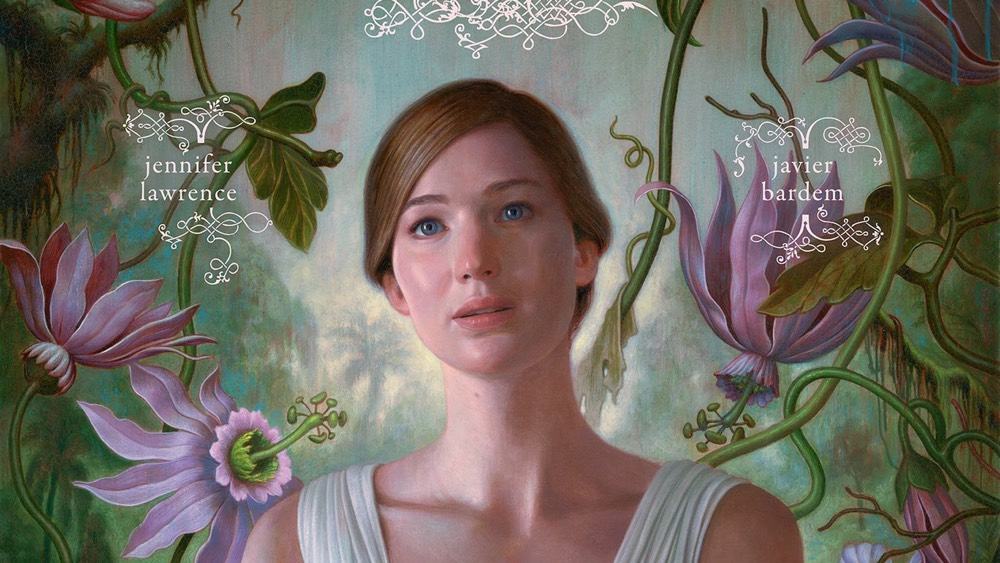
“A couple years ago, I was sitting around going, ‘Why is no one thinking about our mother?’ Not your mother, not my mother, but our mother, this mother who gives us life. And I was like, ‘I want to tell her story.’ She gives us all this love, she gives us a home, she gives us endless gifts, yet we treat her like shit.”
That’s what director Darren Aronofsky told an audience at this year’s Toronto International Film Festival that had just seen “mother!,” his transcendent, apocalyptic freak-out about a selfless homemaker, a vain poet and the ravenous mobs who storm their pristine, isolated Victorian home.
It was a message worth repeating, but Aronofsky didn’t need to vocalize it. His depiction of human hubris and ecological decay is so clear-eyed and ruthless that “mother!” registers not just as a home-invasion horror show, but as a scalding allegory of humanity’s vicious abuse of the Earth.
It would be foolish to suggest that there is only one “right” interpretation of “mother!” Since the movie’s release on September 15, myriad theories have been blurted out (it’s about religion! It’s about celebrity culture! It’s nonsense!). But to get caught in the whirl opinions and objections is to miss the point.
At the core of “mother!” is an outraged, deeply felt portrait of how we have devastated our planet via war, global warming, and pure, lethal idiocy. It may re-harness the psychological terror of Aronofsky’s “Black Swan,” but it has as much in common with that Oscar-winning cine-nightmare as it does with “An Inconvenient Truth.”
In other words, if you aren’t too busy vomiting after the end credits have rolled, you’ll probably feel like joining the Sierra Club or melting your car keys. Here are five reasons why.
1. It’s meant to be taken symbolically, not literally
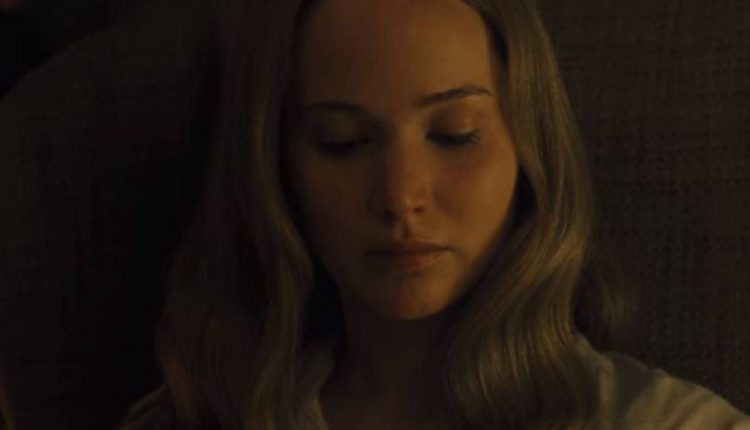
Flames engulf a woman as a solitary tear trickles down her scorched cheek. Once the fire has cleared, a smiling man gingerly places a crystal atop a skeletal apparatus. Then, a house builds itself, complete with a woman whose long brown hair is woven together in a single braid. “Baby?” she calls out.
Those moments begin “mother!” and probably made most viewers ask what the heck they were watching (a horror movie? A romantic melodrama? A supernatural home-improvement TV show?). Yet as natural as it is to wonder exactly what genre the movie belongs in, the answer is kind of beside the point.
As “mother!” evolves from a tender tale of marital unease to deluge of chaos in which war rages through that pale, immaculate house, it becomes clear that what matters is not what kind of story it is, but what it means. From the first shot to the last, Aronofsky makes sure that we understand that this is not a tale whose events are meant to be taken literally, but to symbolize a greater idea.
That greater idea is embodied by Lawrence’s character, who is known simply as “mother” (without that cheeky exclamation point). Her husband (Javier Bardem) is a poet whose house was apparently consumed by a fire, inspiring mother to undertake a one-woman restoration. Now, she spends her days painting the not-quite-finished house and cooking for the poet. “I want to make a paradise,” she declares in her chiffon-soft voice.
Since this is a Darren Aronofsky movie, paradise is never really an option. The arrival of a coughing surgeon (Ed Harris) and his smarmy wife (Michelle Pfeiffer) brutally upends the carefully calibrated ecosystem that is mother’s world. Like excrement luring plump flies, the surgeon and his wife draw a string of unwanted, volatile guests to the house, setting the table for a depraved, kinetic third act that’s like the sprawling last half of “The Dark Knight Rises” crammed into a few rooms.
“Mother!” is strewn with clues that its maelstrom of story and character is designed to do something more than stoke fears of domestic anarchy. No one in the movie has a name a proper name, a clearly defined occupation (the poet’s writing is cloaked in mystery; the surgeon doesn’t seem to do any surgery), or a personality that can’t be summed up in two words. The characters are not so much human beings as they are representations of concepts that range from brittle kindness to slinky egotism to bludgeoning greed.
The same goes for the house. While “mother!” was filmed in Montreal, there is no suggestion that the movie takes place in Canada or anywhere else. It seems to exist in a nowhere world devoid of cell reception, television, internet, or rain. Similar to mother and the poet, the house registers as a spectral abstraction—a representation of idyllic innocence just waiting to be corrupted. It could mean anything.
Well, not anything. The vagueness of “mother!” is what gives it the freedom to symbolize something, to be a clean canvas on which massive ideas can be painted—starting with who mother is the mother of.
2. Mother and her house represent Earth

An azure-skinned mutant, a teen gladiator, and a rug-cutting widow are among the physically and emotionally draining roles that Lawrence has embodied in her swing-for-fences-and-shatter-them career. Yet those performances pale next to the grandeur of her glassy vulnerability and cathartic fury in “mother!,” which requires her to give voice to not only to one person, but to an entire planet.
The semantics of her character are dizzying. You could argue that mother and the house are, respectively, Mother Nature and the Earth; you could argue that those two entities are one and the same (in The New York Times, Melena Ryzik noted of Lawrence, “the sounds of the ravaged house—like creaking floorboards—are her voice, digitally manipulated”). But the point is that together, they create a physical representation of both our word’s beauty and the many ways in which it has been sundered.
Among Earth’s many remarkable qualities are its ability to pull off the double act of being both planet and doormat. In what amounts to likely the lamest gift exchange in the history of the universe, this world has provided humans with food, air, water, and the Canadian Rockies, while humans have given it terrorism, nuclear power, plastic grocery bags, and Jar Jar Binks.
Mother certainly knows a thing or two about unfair trades. She cleans, makes tea, and puts up with surgeon and his wife having sex in front of her face; in return, mother is ignored, belittled, and slut-shamed in her own house. The surgeon’s wife may whine, “You give and you give and you give. It’s just never enough,” but if anyone has reason to say that line, it’s mother. Like our planet, she provides us with “endless gifts” (to use Aronofsky’s phrase) and receives only abuse and neglect.
She also has little choice but to endure it—even though she’s pregnant throughout much of the movie. This is a key component of the film’s allegory. One of the most tragic things about Earth is that while it is mighty in both size and gravitational force, there is little it can do to protect itself; it can hold a moon in its orbit, but it can’t do much to stop an arsonist or an oil spill.
Similarly, mother is tough, but often timid. And while the movie may have been more satisfying if she was as ruthless as Charlize Theron in “Mad Max: Fury Road,” the power of Aronofsky’s allegory would have been diluted if mother didn’t look terrifyingly vulnerable while crawling through the ruins of what was once her home.
She is not, however, entirely helpless. When threatened, this planet’s last resort is to keep us at bay with the mighty weapons at its disposal—including fire, water, and the ability to move the earth itself. In a way, mother does the exact same thing, ending the movie in a whirl of destruction that is at once damnation, salvation, and revenge upon those who have spited her forbearance, devotion, and love.
3. The poet represents humanity’s complacency
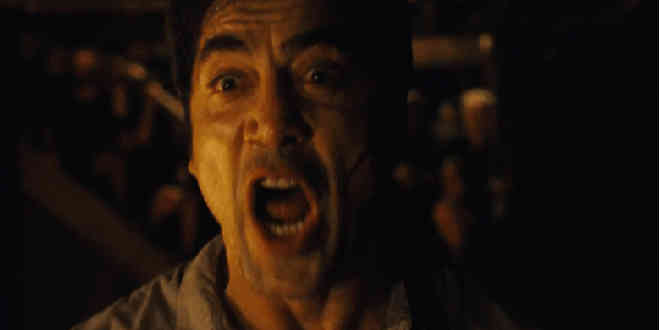
When Aronofsky was in seventh grade, he composed a poem about Noah’s Ark. “The rain continued through the night and the cries of screaming men filled the air,” he wrote, offering a premonition not only of his waterlogged 2014 biblical epic “Noah,” but an enduring fascination with religion that also bubbled to the surface of 2006’s “The Fountain” and “mother!,” which casts Bardem’s poet as a formidable but lackadaisical God.
But “mother!” isn’t about God. The poet’s evolution (he goes from forking over his creations to his fans to being horrified by their violent, possessive adoration) may contain traces of divinity, but Aronofsky uses religious narratives mainly as vessels to ferry environmental concerns. Just as the wayward astronaut Tom Creo (Hugh Jackman) turned out to be God, but not really, in “The Fountain,” the poet embodies an all-too-earthbound failing: the nearly unbelievable complacency that has long greeted global warming.
Complacency has been the default mode of our ever-inventive and ever-bumbling species since the hole in the ozone layer was discovered in the 1980s. Despite a Mt. Everest-sized pile of evidence that climate change is caused by human activity (according to NASA and the National Oceanic and Atmospheric Administration, 2016 was the warmest year on record globally), too many people still ignore alarming klaxons like the melting of the glaciers in Glacier National Park.
The poet takes a similarly blasé attitude toward mother’s concerns about their increasingly out-of-control houseguests. After mother rebukes him for inviting the surgeon to stay the night without asking if it was all right with her, he insists that he didn’t “think it would be a big deal.” Of course he didn’t. Even after the surgeon’s eldest son (Domhnall Gleeson) deals his own brother (Brian Gleeson) a mortal blow that leaves mother with a seriously gross mess to clean up, the poet invites even more of the surgeon’s family to swing by. Surely, he believes, nothing else could go wrong.
That belief is a disease that has escalated the effects of global warming. “Mother!” mirrors its onset by revealing how the poet’s idiocy leaves mother to be defiled by acts of violence that are at once awful and awfully absurd. Which underscores Aronofsky’s point: That our species’ role in climate change is both horrendous and ludicrous.
4. The houseguests represent pollution, war, and extremism
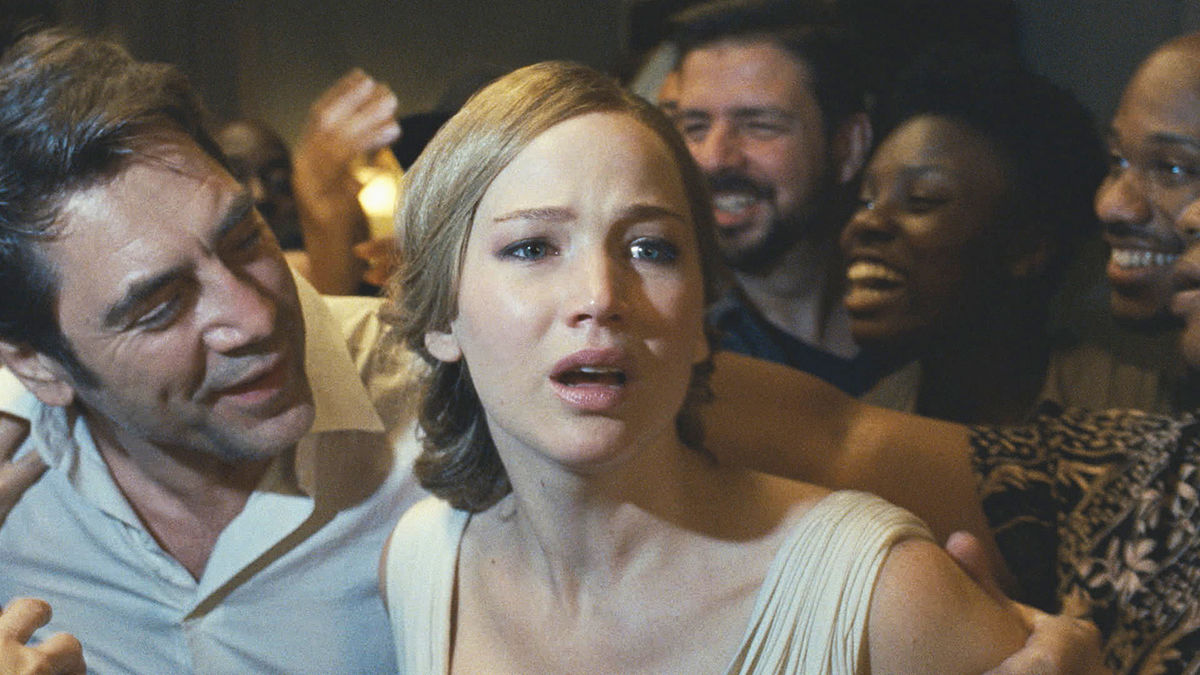
So, did you hear about that “F”? Of course you did. The fact “mother!” was branded with that dreaded (coveted?) grade from CinemaScore, the organization that proclaims itself to be “the industry leader in measuring movie appeal among theatre audiences,” has already cemented itself as part of the movie’s legend. For “mother!” lovers, it can be construed as proof of the film’s perverse power; in the eyes of nonbelievers, it’s probably evidence that Aronofsky had made a weird little curiousity unworthy of serious thought.
But how could “mother!” have received any other grade? Its villains aren’t an unknowable apparition like the Joker in “The Dark Knight”—they’re us. Mother may dominate the action (she’s in every scene), but as the personification of pollution, war, and extremism, the visitors who invade her home are stand-ins for all of humanity (and yes, that includes people like this critic who have enough disposable income to buy tickets to high-brow films directed by Darren Aronofsky).
Pollution is represented in a literal sense by the surgeon, who is told not to smoke in the house and does it anyway. But it also emerges in the Cain-and-Abel story of his two sons, whose battle leaves a blood stain that would probably flummox even the most vigorous Bon Ami users. Spongy and acidic, it burns a hole in the floor and eats away a chunk of the basement wall—the spot where the destruction of the house is later triggered. You can probably figure out what real-world environmental catastrophe that represents.
The poet’s fans spread destruction of a more visceral variety. A scene where a child pees on the floor is just the beginning—soon, the fans start stealing and smashing mother’s possessions. This draws cops and SWAT teams to the premises, but they prove to be more or less useless against a rising crescendo of insanity that includes fighting, a protest march, and Kristen Wiig as a very cheerful executioner.
Aronofsky unleashes this pandemonium more or less in real time (while mother is in labor, no less). Yet so much happens so rapidly that you feel as if you’re watching the history of an entire war funneled through the house. By allowing us to view acts of savagery not as isolated headline grabbers, but as part of a chaotic continuum, Aronofsky forces us to appreciate the ludicrousness of war like no other twenty-first century filmmaker has.
Extremist faith figures prominently into this insanity. So speedy is Aronofsky’s pacing that in a matter of minutes, we see the fans craft what appears to be a religion that honors the poet (and is centered around the refrain, “His words are yours”). Supposedly, this fealty comes from a place of deference, but it culminates with an unbelievable act of barbarism committed against the film’s version of Jesus (more on that later), transforming an already-unsettling movie into one of the most disturbing visions of human cruelty put to screen.
Does that make “mother!” an anti-religion movie? Not necessarily. Aronofsky’s point is not that religion is inherently evil, but that devotion can easily give way to costly extremism—and that in the end, it’s paid for by people like mother and, yes, Christ himself.
5. The ending is a wake-up call for all of humankind
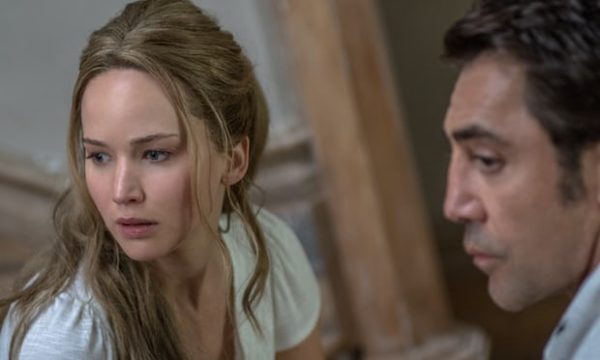
Many of the best films of 2017 are upstanding models of do-gooder cinema. “Beauty and the Beast” attacked the xenophobia aroused by Dan Stevens’ movingly empathetic “monster”; “Wonder Woman” delivered some sharp jabs at gender inequality; and both “War of the Planet of the Apes” and “Dunkirk” unleashed harrowing indictments of fascism that, despite being rooted in, respectively, the future and the past, felt tailor-made for this age of bigotry and covfefe.
“Beauty,” “Wonder,” “War,” and “Dunkirk” are all fine, sensitively directed movies. But they share one mistake: They all end on a redemptive narrative grace note that cries out: Hey, no matter how bad things get, the good will triumph (after a reasonable number of heroic sacrifices), the wicked will be punished, and Gal Gadot will inject a dose of idealistic spunkiness into November’s “Justice League.”
These messages of hope are pleasantly reassuring (although even Gadot probably won’t be able to redeem the notoriously troubled “League”). They also make it easy to dismiss the horrors that these films depict. Why, for instance, should you bother donating to a chimpanzee sanctuary when “War for the Planet of the Apes” assures you that a snowy avalanche will conveniently decimate the human race, leaving Andy Serkis and his fellow mo-cap monkeys free to march into a sunlit promised land?
By contrast, Aronofsky deserves credit for making a movie that doesn’t temper its activism with optimism. With fire-and-brimstone passion, “mother!” demands that we embrace pacifism and environmentalism—or else. It’s a loud, bloody bully of a movie and while its belligerence seems to have infuriated some moviegoers, be honest: Asking people nicely to please, please recycle doesn’t always work. Sometimes, what we need is righteous, Aronofskian rage.
That rage nears its zenith as mother gives birth to her child, a boy (you can call him Jesus 2.0). Desperate to please his ravenous fans, the poet insists they show off the newborn; as any sane person would, mother objects to the prospect of revealing their boy to a crowd of destructive psychopaths (one of whom sexually harassed her while she was in labor). “I’m his father,” the poet dopily protests, to which mother simply replies, “I’m his mother!”
And so begins a stare-off. The poet doesn’t attempt to take the boy; he simply sits in a chair, glaring at mother and waiting for her to fall asleep. For hours, she fights to stay conscious…then falls prey to exhaustion. When she awakens, she finds the poet stupidly presenting the boy to his disciples, who go from worshiping the child (here goes nothing) to accidentally breaking his neck (be warned: it gets worse) to feasting on his remains.
Inevitably, the poet insists that his fans are “sorry” and that mother should “forgive them.” Her response? “NO!” So immense is her rage that it splits the floor in two, freeing her to rush to the basement and defend herself in the only way she can: by burning down this house that she has loved and nourished.
What’s left to say after witnessing such horrors? First of all, “Yikes.” But once your shock dissipates like a cloud of dust, you are left with only one thought: This is what will happen to our planet if we push it. Even the most forgiving mother can only take so much; eventually, she will snap and by then, half-hearted concessions like reusing a water bottle will be worth less than a rusted penny.
Unless we do something more. And who could not after watching “mother!”? The movie makes personal that which is too sweeping and terrifying to comprehend. Our planet, our home, is so vast that it’s easy to ignore its suffering. But there’s no ignoring the moment when mother tells the poet, “I gave you everything. You gave it all away,” or the image of her body aflame in her world, daring us to do better in ours.
Author bio: Bennett Campbell Ferguson is a freelance film critic and culture writer based in Portland, Oregon. In addition to reviewing films for Willamette Week, he founded the blog T.H.O. Movie Reviews, which he also edits.